PeoplePerHour Review: The Marketplace for Low-Paying Freelance Jobs
PeoplePerHour Profile
“PeoplePerHour is a purpose-driven business”, Xenios Thrasyvoulou, Founder and CEO, PeoplePerHour.
PeoplePerHour is a private company founded in 2007 with a registered office in London, UK and other offices in Athens and New York City. Bloomberg describes it as follows: “People Per Hour Ltd. operates an online marketplace for connecting businesses with independent and self-employed service freelancers. The Company enables businesses to find, hire, and manage freelancers in the service categories of IT, graphic design, telesales, marketing and PR, copywriting, and translation services.”
As of 2015 PeoplePerHour received $10.5 million in different rounds of investment.
Looking at the media coverage, from the humble beginnings of local news and start up websites, PeoplePerHour has been featured in the main press like The Telegraph, Forbes, The Financial Times and Entrepreneur among others.
Their About Us page has no formal structure and no corporate information highlighting the start date of the company or its historical milestones. It is simply a colloquial narrative from the chief executive. The actual corporate information is hidden from the main navigation and existing information on the blog has been deleted.
The most interesting information from that page is about the numbers:
“Number and value of jobs posted at any one time: More than 150,000,
valued at £53M/$83M
Number of freelancer members offering services: More than 210,000”
It looks like the page hasn't been updated since 2012. It also mentions the commission rates that are deducted from freelancers' payments:
“PeoplePerHour only charges a Commission Fee on success – when an Invoice raised is paid by the Buyer. The fee is 3.5% for all Billings above the first $280 each month. The first $280 incurs a 15% fee. This is the equivalent of about one day’s full time work on PeoplePerHour, making the rest of the month’s work billed at the low rate of 3.5%. The only other fees PeoplePerHour charges are passing on payment processing fees where applicable, but PeoplePerHour provides a free option for payment by ACH, BACS, and debit card.”
I compiled this profile based on available company information from various sources including Bloomberg and CrunchBase, and PeoplePerHour's website.
PeoplePerHour Company Presentation Video
How PeoplePerHour Works
We all have bills to pay. Sometimes us freelancers take on low-paying jobs while we are in between contracts.
As a freelancer on PeoplePerHour, in order to be able to bid for jobs you need to complete a profile. The more information you have on your profile, the more chances you have to be selected to bid for projects.
You can also set an “Hourlie” which is a service that you charge by the hour (for example, write a press release).
Successful bidders for projects usually win based on price, so don't get tempted to undersell yourself just to get your first jobs.
Once the client is satisfied with your completed work, they will leave feedback on your profile page. Most importantly, they will pay you into your Wallet, which is an escrow service.
Payments are held there for at least 48 hours and you can't withdraw cash from the Wallet during that time.
Be aware that Peopleperhour will charge you a commission and withdrawal fee which is automatically deducted from the amount you are allowed to withdraw into your bank account or Paypal account.
PeoplePerHour Screenshot, CERT

What is CERT?
CERT is a ranking system based on an algorithm that calculates which freelancers are getting the best feedback, so that they can climb the Peopleperhour chart and gain more visibility.
The CERT calculations take into account response time, fast delivery of projects and lack of disputes.
In other words, CERT awards compliance – and the only way to avoid disputes (and trust me, there will be plenty of occasions) is to pick the clients you work with very carefully.
Peopleperhour defines the criteria that make up the CERT score as four pillars:
-
community
-
engagement
-
repeat usage
-
trust
I would say that, just like other websites for freelancers, there is a lot of emphasis on the community element. In other words, each time you log on and interact with other users, you become a prime target for messaging (I don't mean spam, but requests to bid for projects) and for purchasing premium services (for example to promote your Hourlie) and you are doing the website a favour by spiking its traffic and page views.
You are also rewarded for bringing your existing clients to the site at zero fees and, in theory, you are more likely to get to the next CERT tier faster if you promote your profile on social media (you are welcome Peopleperhour, free advertising!). The website says that if your pph profile gets more views it “will push you up”.
Compliance means being in the good books and, in theory, getting a more prominent profile. You get rewarded by being on the site and billing projects through the platform and penalised for occasional use. Therefore, you might have a stellar CERT score but if you haven't logged on the site for months you are less likely to be visible to potential clients.
Sellers are ranked from CERT1 to CERT5, with an additional top tier called Top CERT.
I reached a CERT4 level, and I received a prompt from the site to do my best to reach the next tier: “Sellers who make it to CERT5 on average earn 4x more than those on CERT4.”
In my experience, having a good CERT did not make much of a difference, as there are too many registered sellers to really stand out.
PeoplePerHour Feedback

How Many Users Are at the Top of PeoplePerHour's CERT?
Top of the leaderboard are web developers (the top developer has more than 1,000 positive reviews with a perfect 100% feedback score), PR/copywriters (the top copywriter also has more than 1,000 positive reviews), CRM consultants, social media managers (one of the top social media consultants has more than 4,000 positive reviews), SEO consultants.
Only the top 0.5% (I repeat 0.5%!) of sellers get a special Top Cert badge.
Considering that, as of 2012, there were 210,000 sellers registered on the site, the chances of getting some visibility are minute.
How to Pick the Right Client on PeoplePerHour
Always check the online profile of a potential client and look through the feedback and ratings. Do they all look genuine? Are they all clustered around a particular date and there are no other comments before or after that?
Are there any negative comments among a majority of positive comments, and do they look like “sour grapes” or genuine experiences that went wrong?
Checklist for Choosing the Right Client
Do:
| Don't:
| Optional:
|
|---|---|---|
Check how long the client has been on the site
| Believe all the stellar comments on the profile if they are all clustered in the same period of time (they could be all from the same person, maybe a friend of the client)
| You can ask questions in the Clarification Board but sometimes clients don't reply to them
|
Check the ratings and feedback from sellers
| Undersell yourself
|
PeoplePerHour Online Reviews

My Experience of PeoplePerHour
All in all, I had a mildly positive experience with PeoplePerHour, as I was always paid for my work but the issue is that all paid projects I accepted to work on were below my advertised hourly rate. My impression was that, if I didn't do that, I wouldn't be working on any projects at all. Freelance writing and social media jobs, in particular, don't attract high rates of pay.
On top of this, I had to spend a large amount of time searching for suitable jobs that weren't paying ridiculously low and that matched my skills and experience.
I consider myself lucky as I received all the payments as agreed with clients. I was quite shocked to see scathing online reviews of PeoplePerHour mostly lamenting the fact that freelancers didn't get paid for their work.
I created my profile in 2012 and stopped using the website to get freelance writing and social media consulting work at the end of 2014 as I could not find high-paying projects. It seems that since then customer satisfaction has gone down, looking at PeoplePerHour online reviews.
Interestingly enough, as I was doing the research to write this article, I logged on the site after several months of inactivity and, guess what? Within minutes I received a message requesting me to bid for a job. If you are curious to know what the project was about, it was to write 2 x 800 words articles for a project total that was less than a third of what I would charge for 1 article.
PeoplePerHour: Emails about Bidding for Jobs

Have You Used PeoplePerHour?
The Verdict
I wouldn't recommend using PeoplePerHour to make a living nor to earn extra money as it's not cost-effective; however, if you are new to freelancing and need to build your online profile, you could experiment with completing 3-5 simple jobs and getting good feedback on them. Focus on short projects with a quick turnaround, like writing product descriptions or short articles. Once you receive enough positive feedback, you can use the online portfolio you have built to showcase your skills. However, if you decide to try PeoplePerHour you need to first check the latest media coverage on the company and online reviews to get a complete picture.
So, this was my experience of using PeoplePerHour to bid for freelance writing jobs; have you used the site? I'd love to hear about your experience in the comments, thanks.
If you are looking for freelance work, please also check my reviews of Lionbridge and Clickworker.








